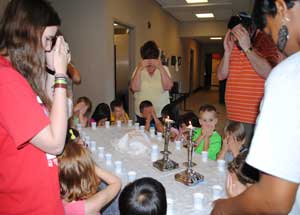Editorial
Front Page - Friday, July 16, 2010
Regardless of religion, Jewish Cultural Center welcomes all within
Erica Tuggle
 Children at the Aleph Bet children’s center pre-school program participate in Shabbat to observe the Sabbath. The Jewish Cultural Center allows and encourages any religion and race to their events and services to build and foster a strong unified Jewish Community.
- Erica Tuggle
Children at the Aleph Bet children’s center pre-school program participate in Shabbat to observe the Sabbath. The Jewish Cultural Center allows and encourages any religion and race to their events and services to build and foster a strong unified Jewish Community.
- Erica Tuggle
It’s Shabbat at the Aleph Bet pre-school inside the Jewish Cultural Center, and the children are gathered around a table reciting a Hebrew prayer song, drinking white grape juice out of paper cups and eating their piece of Calla bread with gusto.
This is not an out of the ordinary experience for Jewish children, but for this group, that is comprised of those of all faiths, it is a cultural exchange experience that many are not privy to at such a young age.
The three-star Aleph Bet pre-school, like all the programs of the Jewish Cultural Center, is open to anyone, and is only one of the three major facets of the center, says Ann Treadwell, program director. The other two areas that the center addresses are cultural activities and social services, including van transportation, delivered meals, medication consultation, a community nurse and social worker.
Executive Director Michael Dzik says, “We really try to wrap our services around people to allow them to recognize us as a caring, nurturing, safe place to put their trust in.”
This kind of place lends itself to the ideal environ-
ment for difficult conversations, Treadwell says, and those at the center want their services to be the kind to encourage conversation between all people.
“We nurture the idea that when you come to this place you can come from anywhere, and any background, but the rule is that you respect that other people are going to have different opinions,” she says.
The events that encourage conversation are varied and range from film series, men’s night, women’s night, weekly Middle Eastern dance classes, academic discussion during the monthly foreign policy dinners, trips to Israel, and frequently changing exhibits. The beauty of the events, she says, lies in the fact that the majority of those who attend are not part of the 1,500 people in the Chattanooga Jewish community.
Just like all the events and services, Dzik says, “If someone walks in and needs a food box, we don’t ask if you are Jewish or not. We just provide the best care we can.”
The current exhibit, ongoing until July 23, is “Growing Up Jewish,” which entails not only a portrait of growing up Jewish in Chattanooga, but all over the world, and the different experiences involved in this, from Cub scout ceremonies, confirmation, proms and similar rites of passage.
Treadwell says, “The non-Jewish community looks at these traditions several thousands of years old and understands things about their own religion such as, where confirmation in the Christian community comes from.”
She says the other exhibits throughout the year range all over the board, like the next exhibit to focus on “Figures” in art from Jewish and non-Jewish artists. In July, there was a First Amendment Dinner July 8 that featured guest speaker David L. Hudson, Jr.
The Jewish Community Federation of Greater Chatta-nooga (JCFGC) was established in 1931, and ever since then has been supported by donations and their annual campaign in August through December. Half of the funds they receive are sent overseas to help efforts for all religious affiliations in over 60 countries; the other half stays here to help with programs and services. The center also makes grants available for organized Israel trips and summer camps such as the upcoming Philanthropy Camp.
This sensational camp will begin its second year during the week of July 26 to 30 for elementary aged students to teach them to be charitable in how they conduct their lives. This includes lessons on taking care of the environment and elders, and is done in a fun way with trips and activities, Dzik says.
Even as a second year program, the reception has been favorable and has grown from 25 children last year to 65 this year, with a waiting list. The children also build “Care Town,” as they would imagine an ideal city to look like and that is also displayed as an exhibit at the camp’s end.
The majority of their events are made possible with the help of their volunteer base that also keeps in touch with the over 300 seniors the center provides for, Treadwell says.
Dzik says, “I feel everyone here is a team. The van driver is just as important as the social worker…The little caring things that we do, I think, make us such a different organization.”
The JCFGC emphasizes that, as a United Way non-
profit, their events are open to all in the community regardless of political opinion, religion or race, and that no religious rituals go on within the center. A list of all their activities can be found online at www.jewishchattanooga.com and through their free monthly newspaper, “The Shofar.”
|
|